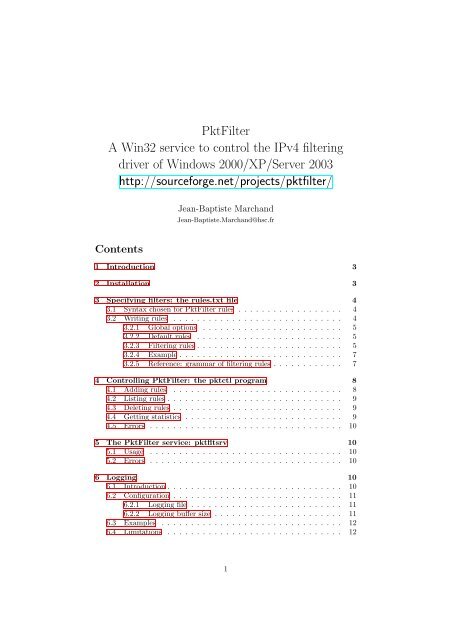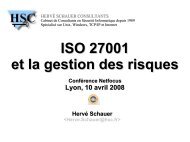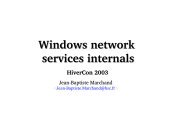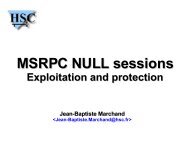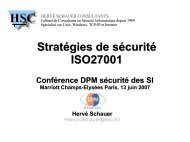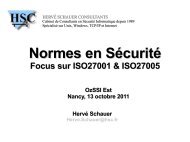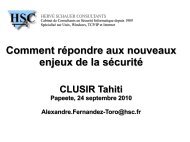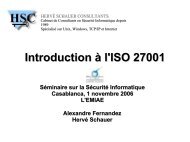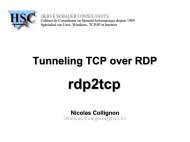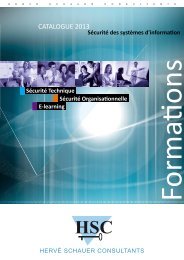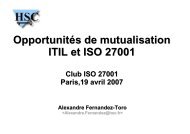PktFilter A Win32 service to control the IPv4 - Herve Schauer ...
PktFilter A Win32 service to control the IPv4 - Herve Schauer ...
PktFilter A Win32 service to control the IPv4 - Herve Schauer ...
Create successful ePaper yourself
Turn your PDF publications into a flip-book with our unique Google optimized e-Paper software.
1 Introduction<strong>PktFilter</strong> is a free software (distributed under <strong>the</strong> BSD license) that configures<strong>the</strong> <strong>IPv4</strong> filtering driver found in Windows 2000/XP/Server 2003.Normally, this driver is configured 1 via <strong>the</strong> Routing and Remote Access(RRAS) <strong>service</strong> of Windows. However, <strong>the</strong> Packet Filtering API 2 documentedin MSDN enable third-party software <strong>to</strong> configure it.The advantages of <strong>PktFilter</strong> over RRAS are:• <strong>PktFilter</strong> is a small <strong>service</strong> dedicated <strong>to</strong> IP filtering whereas RRAS handlesmany things in addition <strong>to</strong> IP filtering, like IP routing.• Filtering rules of <strong>PktFilter</strong> are specified in a text file, following a well-knowsyntax, used by IP Filter. RRAS filtering rules can be specified ei<strong>the</strong>r viaa graphical interface of <strong>the</strong> RRAS MMC plugin or with netsh, using anobscure syntax.• <strong>PktFilter</strong> reports filtering statistics, whereas RRAS only reports limitedinformations with netsh.• <strong>PktFilter</strong> supports logging of blocked packets.The o<strong>the</strong>r possibilities for IP Filtering available in standard under Windows2000/XP/Server 2003 are:• Using IPsec for IP Filtering. This has been described in many articles butthis is not a good idea, as some traffic is not filtered by IPsec (Kerberostraffic on TCP port 88 and IKE traffic on UDP port 500). Filters can<strong>the</strong>n be bypassed using one of <strong>the</strong>se two ports as source.• Using Internet Connection Firewall (ICF 3 ). This is only available in WindowsXP and Windows Server 2003. The IP filtering driver used by ICFis supposed <strong>to</strong> be stateful (i.e, creates states when communications areestablished and <strong>the</strong>n uses <strong>the</strong>se states <strong>to</strong> validate traffic). However, it canonly filter incoming traffic. Moreover, Microsoft has no plan <strong>to</strong> releasean API similar <strong>to</strong> <strong>the</strong> Packet Filtering API, <strong>to</strong> <strong>control</strong> <strong>the</strong> kernel-modedriver used by ICF.Important:<strong>PktFilter</strong> only configures <strong>the</strong> <strong>IPv4</strong> filtering driver present in recent Windowssytems. <strong>PktFilter</strong> does not implement IP filtering operations.Thus, <strong>PktFilter</strong> can not be extended <strong>to</strong> do stateful IP filtering, traffic redirectionor network address translation. This kind of functionnality can only beimplemented in a NDIS intermediary driver.2 Installation<strong>PktFilter</strong> is composed of two programs:1 http://www.microsoft.com/windows2000/techinfo/reskit/en/Intwork/inae ips wxnv.htm2 http://msdn.microsoft.com/library/en-us/rras/ipflt 7oo5.asp3 http://www.microsoft.com/windowsxp/pro/techinfo/planning/firewall/3
C:\> pktctl -Ieth0: (MS LoopBack Driver): 172.16.42.42eth1: (3Com E<strong>the</strong>rLink PCI (Microsoft’s Packet Scheduler) ): 192.70.106.142In this example, <strong>PktFilter</strong> identifies <strong>the</strong> only physical adapter with <strong>the</strong> eth1identifier.3.2.1 Global optionsRules always start with global options, i.e filtering options that are global <strong>to</strong> agiven interface.Currently, only one global option is allowed:option small_frags on eth0This option specify <strong>to</strong> refuse fragmented packets with fragments <strong>to</strong>o small.By default, it seems that all fragments with a size lower than 16 bytes areconsidered as small. This may be changed modifying <strong>the</strong> FragmentThresholdvalue, under <strong>the</strong> Parameters registry key of <strong>the</strong> IpFilterDriver driver but quicktests did not determine easily what this registry value does exactly.It is recommended <strong>to</strong> activate this option.3.2.2 Default rulesTwo default rules must be specified, for input and output traffic. Theses rulesspecify one of <strong>the</strong> two possible filtering behavior:• accept all traffic by default (pass keyword)• block all traffic by default (block keyword)Usually, <strong>the</strong> most secure technique for IP filtering is <strong>to</strong> block all traffic and <strong>the</strong>nexplicitely allow some kind of traffic. In <strong>PktFilter</strong>, you can achieve this with<strong>the</strong> following default rules applied <strong>to</strong> <strong>the</strong> eth0 interface:block in on eth0 allblock out on eth0 all3.2.3 Filtering rulesThe filtering rules specified after <strong>the</strong> two default rules can only be rules thatmodify <strong>the</strong> default behavior. For example, if you specified a default policy thatdrops all incoming packets, input rules can only start with <strong>the</strong> pass keyword.Filtering rules are composed of <strong>the</strong> following ordered keywords:• Filtering action:– pass, <strong>to</strong> allow traffic– block, <strong>to</strong> block traffic• Direction– in, for incoming traffic– out, for outgoing traffic5
• Interface– on ifx, where if is <strong>the</strong> type of your network interface (for example,eth for E<strong>the</strong>rnet adapters) and x is <strong>the</strong> index of <strong>the</strong> interface. Useoption -I of pktctl <strong>to</strong> find <strong>the</strong> index of your interfaces.• Pro<strong>to</strong>col– pro<strong>to</strong>, followed by∗ tcp, for TCP pro<strong>to</strong>col∗ udp, for UDP pro<strong>to</strong>col∗ icmp, for ICMP pro<strong>to</strong>col∗ number, where number is <strong>the</strong> integer associated <strong>to</strong> a pro<strong>to</strong>colencapsulated in <strong>IPv4</strong>– empty, <strong>to</strong> specify any pro<strong>to</strong>col• Source address– from addr, where addr is <strong>the</strong> <strong>IPv4</strong> address of a host– from subnet/mask, where subnet is <strong>the</strong> address of a subnet andmask is <strong>the</strong> corresponding subnet mask• Source port (TCP and UDP)– port compara<strong>to</strong>r decnumber, where decnumber is <strong>the</strong> source portnumber and compara<strong>to</strong>r, one of <strong>the</strong> following:∗ =∗ >=∗ >∗
3.2.4 Example# drop packets composed of small fragmentsoption small_frags on eth0# default behavior = deny everythingblock in on eth0 allblock out on eth0 all# allow DNS resolution <strong>to</strong> our nameserverpass out on eth0 pro<strong>to</strong> udp from 192.168.1.1 port > 1023 <strong>to</strong> 192.168.1.254 port = 53pass in on eth0 pro<strong>to</strong> udp from 192.168.1.254 port = 53 <strong>to</strong> 192.168.1.1 port > 1023# allow inbound ICMP traffic (ping)pass in on eth0 pro<strong>to</strong> icmp from any <strong>to</strong> 192.168.1.1 icmp-type echopass out on eth0 pro<strong>to</strong> icmp from 192.168.1.1 type echo-rep <strong>to</strong> any# allow RDP (Terminal Services) administration from our administration subnetpass in on eth0 pro<strong>to</strong> tcp from 10.42.42.0/24 port > 1024 <strong>to</strong> 192.168.1.1 port = 3389pass out on eth0 pro<strong>to</strong> tcp from 192.168.1.1 port = 3389 <strong>to</strong> 10.42.42.0/24 port > 1024 \established3.2.5 Reference: grammar of filtering rulesThe filtering rules can be described using <strong>the</strong> following grammar in BNF:filter-rule = global-options | normal-ruleglobal-options = "option" global_option ifaceglobal-option = "small_frags"normal-rule = action [in-out] iface [pro<strong>to</strong>_spec] ip [pro<strong>to</strong>-options]action = "pass" | "block"in-out = "in" | "out"iface = "on" ifname digitifname = "eth" | "ppp" | "sl" | "lo" | "tr" | "fd"pro<strong>to</strong>_spec = "pro<strong>to</strong>" [pro<strong>to</strong>]pro<strong>to</strong> = "tcp" | "udp" | "icmp" | "any" | ip_pro<strong>to</strong>ip_pro<strong>to</strong> = decnumberdecnumber = digit [decnumber]ip = "all" | "from" ip-addr [port-comp | port-range] "<strong>to</strong>" ip-addr[port-comp | port-range]ip-addr = "any" | ip-dotted-addr [ip-mask]ip-dotted-addr = host-num "." host-num "." host-num "." host-numhost-num = digit [digit [digit]]ip-mask = "/" ip-addr | decnumberport-comp = "port" compara<strong>to</strong>r decnumbercompara<strong>to</strong>r = ">" | ">=" | "
| "router_sol" | "timex" | "paramprob" | "timest" | "timestrep" | "inforeq" |"inforep" | "maskreq" | "maskrep"icmp-code = decnumber4 Controlling <strong>PktFilter</strong>: <strong>the</strong> pktctl programpktctl is <strong>the</strong> <strong>control</strong> program of <strong>PktFilter</strong>. It communicates with <strong>the</strong> pktfltsrv<strong>service</strong> through a named pipe.pktctl can be used in two ways:• with command-line switches• in interactive mode (when launched with <strong>the</strong> -i option)Most of <strong>the</strong> command-line switches have <strong>the</strong>ir counterpart commands in interactivemode. This section lists all <strong>the</strong> possible commands of pktctl, both incommand-line mode and interactive mode.Interactive mode is invoked with <strong>the</strong> -i command-line option. The pktctl>prompt will wait for interactive commands (help will list possible interactivecommands).The following actions can be achieved with pktctl:• add rules (loading a file or entering a rule manually)• list current rules• delete rules• get statistics4.1 Adding rulesLoad a rules file:• C:\> pktctl -f rules.txt• pktctl> source rules.txtLoad a rules file, flushing all filters on all interfaces before:• C:\> pktctl -F rules.txt• pktctl> reload rules.txtAdd manually a rule on a given interface, with <strong>the</strong> -a option:• C:\> pktctl -a "pass in on eth0 from 10.0.0.42 <strong>to</strong> any"• netsh> pass in on eth0 pro<strong>to</strong> udp from 10.0.0.42 <strong>to</strong> any8
4.2 Listing rulesList <strong>the</strong> current rules on a given interface, with <strong>the</strong> -l option:• C:\> pktcl -l eth0• pktcl> list on eth0List <strong>the</strong> current rules with <strong>the</strong> rules numbers on a given interface, with <strong>the</strong> -Loption:• C:\> pktcl -L eth0• pktcl> List on eth0This option is useful when a rule must be deleted, given its rule number (seebelow). Input filtering rules are numbered from 1 <strong>to</strong> 127 and output rules from128 <strong>to</strong> 255.4.3 Deleting rulesDelete a rule on a given interface, giving <strong>the</strong> number associated <strong>to</strong> <strong>the</strong> rule, asreported by <strong>the</strong> ’List’ command, with <strong>the</strong> ’-d’ option:C:\> pktctl -L eth0option small_frags on eth0block in on eth0 allblock out on eth0 allrule 1: pass in on eth0 pro<strong>to</strong> tcp from 10.0.0.1 port = 3128 <strong>to</strong> 10.0.0.42port > 1023 establishedrule 2: pass in on eth0 pro<strong>to</strong> udp from any <strong>to</strong> anyrule 128: pass out on eth0 pro<strong>to</strong> tcp from 10.0.0.42 port > 1023 <strong>to</strong> 10.0.0.1port = 3128You can <strong>the</strong>n delete <strong>the</strong> first input filtering rule with:C:\> pktctl -d 2 eth0Delete all rules on a given interface, with <strong>the</strong> ’-Fa’ option:• C:\> pktctl -Fa eth0• pktctl> flush on eth0Delete all rules on all interface:• C:\> pktctl -Fa all or simpler, C:\> pktctl -Fa• pktctl> flush on all4.4 Getting statisticsGet brief statistics for a given interface, with <strong>the</strong> ’-s’ option:• C:\> pktctl -s eth0• pktctl> stats on eth0Get detailed statistics for a given interface, with <strong>the</strong> ’-S’ option:• C:\> pktctl -S eth0• pktctl> Stats on eth09
4.5 Errorspktctl fails if <strong>the</strong> named pipe used for communication with pktfltsrv cannot be opened. An error message is displayed in that case, informing that <strong>the</strong>pktfltsrv <strong>service</strong> is probably not running:F:\Program Files\<strong>PktFilter</strong>\pktctl>pktctl -l eth0error: unable <strong>to</strong> connect <strong>to</strong> \\.\pipe\PktFltPipeStateless Packet Filtering <strong>service</strong> is probably not running5 The <strong>PktFilter</strong> <strong>service</strong>: pktfltsrv5.1 Usagepktfltsrv supports two command-line options:• -i "path_<strong>to</strong>_rules_file" "path_<strong>to</strong>_log_file":installs <strong>the</strong> <strong>service</strong>, where "path_<strong>to</strong>_rules_file" is <strong>the</strong> absolute path <strong>to</strong><strong>the</strong> rules file and "path_<strong>to</strong>_log_file" <strong>the</strong> path <strong>to</strong> <strong>the</strong> logging file.• -u: uninstalls <strong>the</strong> <strong>service</strong>.5.2 Errorspktfltsrv uses <strong>the</strong> standard mechanism of Windows for logging errors. In caseof problems, an event is written in ei<strong>the</strong>r <strong>the</strong> System or Application event log.The most common errors are:• A syntax error in <strong>the</strong> rules file. In that case, an error event is written in<strong>the</strong> System log.• A problem <strong>to</strong> read <strong>the</strong> rules file. In that case, an error event is written in<strong>the</strong> Application log.• The RRAS <strong>service</strong> and <strong>PktFilter</strong> may conflict, as RRAS can manage itsown filtering rules. In that case, a warning event is written in <strong>the</strong> Systemlog.6 Logging6.1 IntroductionStarting with <strong>PktFilter</strong> 0.06, <strong>PktFilter</strong> supports logging of blocked packets.Details about <strong>the</strong> blocked packets are written in a text file, specified at <strong>the</strong>installation of <strong>the</strong> <strong>PktFilter</strong> <strong>service</strong>.The syntax of <strong>the</strong> log file is very similar <strong>to</strong> <strong>the</strong> one used by <strong>the</strong> IP Filter’sipmon daemon and basically contains:• a timestamp• network interface on which <strong>the</strong> packet was blocked• rule set number (always @0) and rule number10
• b for blocked packets, b-frag for blocked fragments• source <strong>IPv4</strong> address, followed, after a comma, by <strong>the</strong> UDP or TCP sourceport• destination <strong>IPv4</strong> address, followed, after a comma, by <strong>the</strong> UDP or TCPdestination port• pro<strong>to</strong>col encapsulated in <strong>the</strong> <strong>IPv4</strong> datagram (tcp, udp, icmp or any IPpro<strong>to</strong>col number)• <strong>IPv4</strong> header length• <strong>IPv4</strong> payload length• TCP flags (if applicable) or ICMP type and code (if applicable)• direction (IN or OUT), only available when <strong>the</strong> default policy is pass6.2 Configuration6.2.1 Logging fileAfter installation, <strong>the</strong> logging file can be changed in <strong>the</strong> following registry value:• Key: HKEY_LOCAL_MACHINE\SYSTEM\CurrentControlSet\Services\<strong>PktFilter</strong>\• Value: LogFileThe <strong>service</strong> has <strong>to</strong> be restarted <strong>to</strong> use <strong>the</strong> new logging file.6.2.2 Logging buffer sizeThe logging mechanism uses a logging buffer with a limited size. By default,<strong>the</strong> buffer size is 4096 bytes.If this size is <strong>to</strong>o limited, <strong>the</strong> following message will appear in <strong>the</strong> loggingfile:# %u packets logged, %u packets lost, used buffer size was %u, <strong>to</strong>tal buffer size is %uTo avoid this situation, you can change <strong>the</strong> buffer size, adding <strong>the</strong> followingregistry value:• Key: HKEY_LOCAL_MACHINE\SYSTEM\CurrentControlSet\Services\<strong>PktFilter</strong>\• Value: LogBufferSize• Content: size (in bytes) of <strong>the</strong> logging bufferAfter this change, <strong>the</strong> <strong>service</strong> must be restarted.11
6.3 ExamplesThe following line corresponds <strong>to</strong> a TCP segment with <strong>the</strong> SYN flag set, sentfrom <strong>the</strong> TCP port 2709 with 192.70.106.76 as <strong>IPv4</strong> source address <strong>to</strong> <strong>the</strong> TCPport 3189 of <strong>the</strong> host with 192.70.106.142:12/04/2002 16:31:29.254 eth0 @0:1 b 192.70.106.76,2709 -> 192.70.106.142,3189 \PR tcp len 20 40 -S INThe following line corresponds <strong>to</strong> a UDP datagram, sent from UDP port 137<strong>to</strong> UDP port 137:12/24/2002 14:02:59.611 eth0 @0:0 b 192.70.106.143,137 -> 192.70.106.159,137 \PR udp len 20 786.4 LimitationsLogging support has <strong>the</strong> following limitations (note that <strong>the</strong>se limitations comefrom <strong>the</strong> Packet Filtering API and <strong>the</strong> Windows <strong>IPv4</strong> filtering driver and notfrom <strong>PktFilter</strong> itself):• Only blocked packets can be logged• Directions of blocked packets (inbound or outbound) is not available, exceptif <strong>the</strong> default policy allows packets7 Limitations - Known bugsIf you decide <strong>to</strong> use <strong>PktFilter</strong> on production systems, you must be aware of <strong>the</strong>following limitations:• The biggest limitation of <strong>the</strong> <strong>IPv4</strong> filtering driver is that you can not mixrules. This is a design limitation, because of <strong>the</strong> default policy. Thus,it is not possible <strong>to</strong> do simple things, such as allowing most of <strong>the</strong> <strong>IPv4</strong>address space except a specifig range.• IP filtering is not active until <strong>the</strong> <strong>PktFilter</strong> <strong>service</strong> starts. Worse, if <strong>the</strong><strong>service</strong> is launched at startup, <strong>the</strong> <strong>service</strong> blocks on <strong>the</strong> PfCreateInterface()function for two minutes. So, in <strong>the</strong> worst case, <strong>the</strong> system is not protectedfor more than two minutes.• IP filtering is not active for local communications (communications using<strong>the</strong> loopback address, i.e 127.0.0.1. As a consequence, no special rulesare necessary <strong>to</strong> allow this kind of communications.• Finally, remember that <strong>the</strong> IP filtering is only active when <strong>the</strong> <strong>PktFilter</strong><strong>service</strong> is running. If, for any reason, <strong>the</strong> <strong>service</strong> crashes, IP filtering willno longer be active.8 Support<strong>PktFilter</strong> has a mailing-list that can be used <strong>to</strong> discuss <strong>PktFilter</strong> issues. Seehttp://lists.sourceforge.net/lists/listinfo/pktfilter-users for more information.12
9 TODO list• Implement log file rotation• Add <strong>the</strong> possibility <strong>to</strong> globally enable or disable logging. Logging couldalso be configured on a per-rule basis but that would be possible only forblocking rules, which implies that <strong>the</strong> default action would be pass, whichis not recommended...• Allow <strong>the</strong> <strong>service</strong> <strong>to</strong> start, even if network interface(s) is/are not yet availableat startup. This would require a mechanism <strong>to</strong> detect when interfacesbecome available.10 His<strong>to</strong>ry• 2003/02/12: version 0.06-beta2– Logging support∗ Supports logging of blocked packets– Some improvements and many bugfixes.∗ By default, <strong>the</strong> pktfltsrv <strong>service</strong> is configured as manual. Afterinstallation, you must explicitly configure it as au<strong>to</strong>matic, if<strong>PktFilter</strong> suits your needs.∗ Address change on network interface will no longer disrupt IP filtering,as it was <strong>the</strong> case before. (The PfBindInterfaceToIndex()API is now used, instead of PfBindInterfaceToIPAddress())∗ Netmasks given in CIDR format (/xx) are now correctly supported.∗ Fix for <strong>the</strong> parsing of numeric icmp-type.• 2002/07/08: version 0.05a– Bugfix in rules parser (some keywords were not evaluated when <strong>the</strong>all keyword was used). Thanks <strong>to</strong> Yann Bongiovanni for bug reportand fix.• 2002/05/31: version 0.05– Implement -d option. Thanks <strong>to</strong> gj for reporting this.– Add -L option. This allows <strong>to</strong> dump active rules and redirect <strong>the</strong>output <strong>to</strong> a file <strong>to</strong> save <strong>the</strong>m.– Bugfixes in rules parser.• 2002/02/18: version 0.04– Complete rewrite of <strong>the</strong> documentation, now formatted with L A TEXin a PDF file.– Bugfix in <strong>the</strong> rules parser, that did not take in account <strong>the</strong> establishedkeyword in rules.13
– Removal of two of <strong>the</strong> three global options previously available, as<strong>the</strong>y are not enough documented <strong>to</strong> be sure about what <strong>the</strong>y do.– Improvement of statistics reporting∗ Rules are no longer displayed in <strong>the</strong> brief statistics reportingmode (option -s or stats keyword)∗ A new option, -S and counterpart keyword, Stats are equivalent<strong>to</strong> <strong>the</strong> old -s option and counterpart keyword stats.∗ The information displayed about dropped fragments in previousversions was incorrect and displayed even when <strong>the</strong> small-fragsglobal option was not active. It is now correctly handled.∗ Incoming TCP SYN segment are now displayed along input filteringstatistics.– Change of <strong>the</strong> rules listing mode∗ Rules numbers are no longer displayed in <strong>the</strong> brief rules listingmode (option -l or list keyword).∗ A new option, -L and counterpart keyword, List are equivalent<strong>to</strong> <strong>the</strong> old -l option and counterpart list.• 2001/10/02: version 0.03– Display netmask when printing rules• 2001/09/08: version 0.02– Better documentation– Small bug fixes• 2001/05/30: version 0.01 (first public version)11 MiscellanousThis software is distributed under a BSD license (<strong>the</strong> license is present at <strong>the</strong><strong>to</strong>p of each source file).Greetings <strong>to</strong>• Ghislaine Labouret: ideas, coding and debugging• Hervé <strong>Schauer</strong> Consultants: support14


